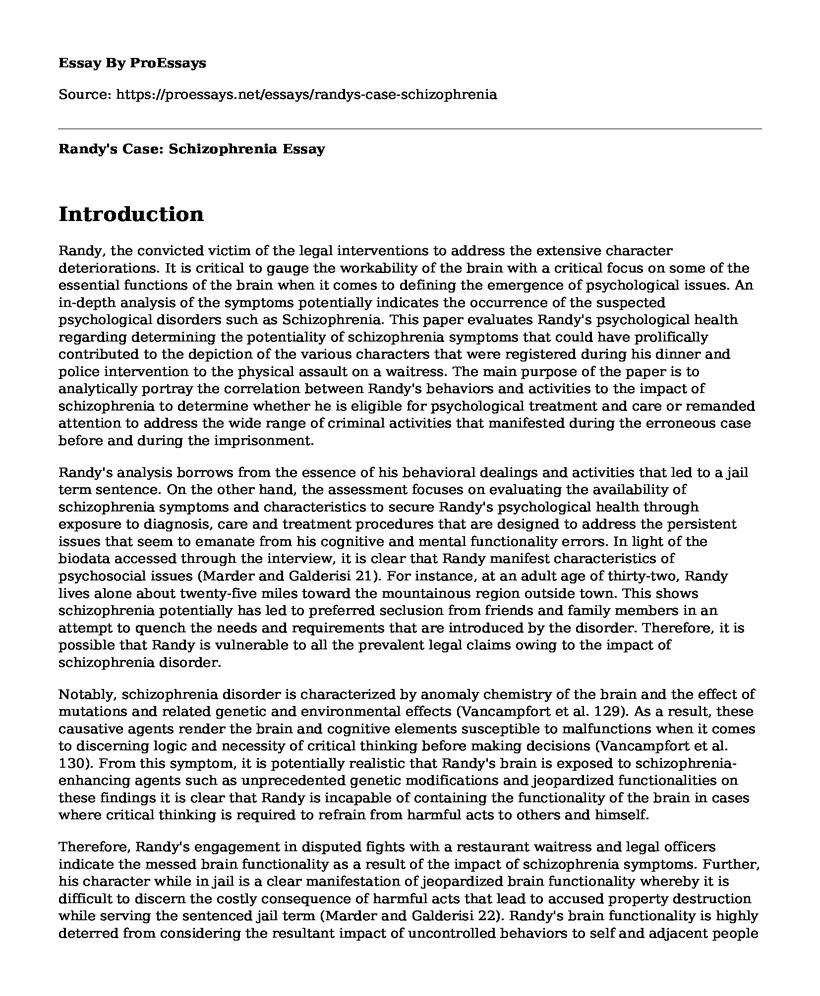Introduction
Randy, the convicted victim of the legal interventions to address the extensive character deteriorations. It is critical to gauge the workability of the brain with a critical focus on some of the essential functions of the brain when it comes to defining the emergence of psychological issues. An in-depth analysis of the symptoms potentially indicates the occurrence of the suspected psychological disorders such as Schizophrenia. This paper evaluates Randy's psychological health regarding determining the potentiality of schizophrenia symptoms that could have prolifically contributed to the depiction of the various characters that were registered during his dinner and police intervention to the physical assault on a waitress. The main purpose of the paper is to analytically portray the correlation between Randy's behaviors and activities to the impact of schizophrenia to determine whether he is eligible for psychological treatment and care or remanded attention to address the wide range of criminal activities that manifested during the erroneous case before and during the imprisonment.
Randy's analysis borrows from the essence of his behavioral dealings and activities that led to a jail term sentence. On the other hand, the assessment focuses on evaluating the availability of schizophrenia symptoms and characteristics to secure Randy's psychological health through exposure to diagnosis, care and treatment procedures that are designed to address the persistent issues that seem to emanate from his cognitive and mental functionality errors. In light of the biodata accessed through the interview, it is clear that Randy manifest characteristics of psychosocial issues (Marder and Galderisi 21). For instance, at an adult age of thirty-two, Randy lives alone about twenty-five miles toward the mountainous region outside town. This shows schizophrenia potentially has led to preferred seclusion from friends and family members in an attempt to quench the needs and requirements that are introduced by the disorder. Therefore, it is possible that Randy is vulnerable to all the prevalent legal claims owing to the impact of schizophrenia disorder.
Notably, schizophrenia disorder is characterized by anomaly chemistry of the brain and the effect of mutations and related genetic and environmental effects (Vancampfort et al. 129). As a result, these causative agents render the brain and cognitive elements susceptible to malfunctions when it comes to discerning logic and necessity of critical thinking before making decisions (Vancampfort et al. 130). From this symptom, it is potentially realistic that Randy's brain is exposed to schizophrenia-enhancing agents such as unprecedented genetic modifications and jeopardized functionalities on these findings it is clear that Randy is incapable of containing the functionality of the brain in cases where critical thinking is required to refrain from harmful acts to others and himself.
Therefore, Randy's engagement in disputed fights with a restaurant waitress and legal officers indicate the messed brain functionality as a result of the impact of schizophrenia symptoms. Further, his character while in jail is a clear manifestation of jeopardized brain functionality whereby it is difficult to discern the costly consequence of harmful acts that lead to accused property destruction while serving the sentenced jail term (Marder and Galderisi 22). Randy's brain functionality is highly deterred from considering the resultant impact of uncontrolled behaviors to self and adjacent people within the environment (Harvey and Rosenthal 112). Randy's activities and duties concur with the symptom requirements and expectation owing to the introduction of schizophrenia psychological disorder (Vancampfort et al. 130). The psychological evaluation determines a close correlation between the depicted character traits and behavior as well as the emergence of schizophrenia in as a mental disorder that regulates the brain functionality, choices, decision-making capacities, and connection of the resultant decisions to logic and critical thinking.
Conclusion
As a result, it is prudent for the District Court to consider subjecting Randy to further clinical trials and tests that aim to determine the prevalence of schizophrenia to enable timely diagnosis and enrollment in the psychological treatment process that is designed to address the issue of schizophrenia, the disorder that hinders the effective functionality and coordination of the brain elements such as neurons, endocrine, and cognitive systems (Harvey and Rosenthal 114). Indubitably, clinical trials will pave the way for effective diagnosis and treatment administration to improve Randy's social and mental functioning in a way that potentially deters the continuous manifestation of the weaknesses that are seen from the case-related activities. This recommendation grants Randy an opportunity to revamp his mental functionality as a permanent solution to similar issues that led to his jailing.
Works Cited
Harvey, Philip D., and Jennifer B. Rosenthal. "Treatment-resistant schizophrenia: course of brain structure and function." Progress in Neuro-Psychopharmacology and Biological Psychiatry 70 (2016): 111-116. Retrieved from: https://daneshyari.com/article/preview/2564667.pdf
Marder, Stephen R., and Silvana Galderisi. "The current conceptualization of negative symptoms in schizophrenia." World Psychiatry 16.1 (2017): 14-24. Retrieved from: https://onlinelibrary.wiley.com/doi/pdf/10.1002/wps.20385
Vancampfort, Davy, Marc De Hert, Brendon Stubbs, Philip B. Ward, Simon Rosenbaum, Andrew Soundy, and Michel Probst. "Negative symptoms are associated with lower autonomous motivation towards physical activity in people with schizophrenia." Comprehensive Psychiatry 56 (2015): 128-132. Retrieved from: http://gala.gre.ac.uk/12288/1/12288_STUBBS_(2014)_(AAM).pdf
Cite this page
Randy's Case: Schizophrenia. (2022, Mar 26). Retrieved from https://proessays.net/essays/randys-case-schizophrenia
If you are the original author of this essay and no longer wish to have it published on the ProEssays website, please click below to request its removal:
- Annotated Bibliography Example on Autism Spectrum Disorder
- Essay Sample - Love is Equal to Cholera as Written by Gabriel Garcia Marquez
- Georgia Suicide Prevention: Evaluating Involuntary Commitment's Effectiveness - Essay Sample
- Finding Happiness: Achieving Balance Between Positive and Negative Emotions - Essay Sample
- Essay on Modern Epoch: Combining Mindfulness, Cognitive, & Behavioral Therapies
- Essay on the Long-Term Impact of Sri Lanka's Disaster: PTSD and Its Effect on Survivors
- Shadow Experience - Essay Sample







